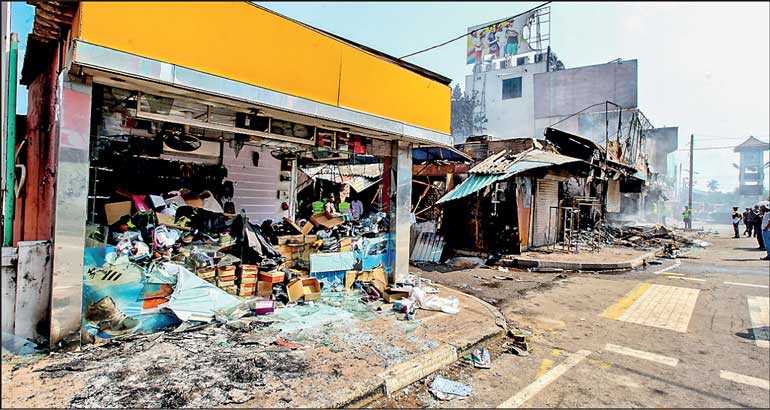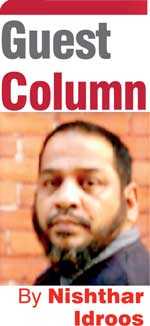Sunday Feb 22, 2026
Sunday Feb 22, 2026
Tuesday, 29 October 2019 00:00 - - {{hitsCtrl.values.hits}}

The war that devastated the country and continued unabated for over 25 years caused significant trials and tribulations for the population and the economy. Sri Lankans endured, suffered and sacrificed much due to its adverse and gruesome nature. An estimated 80,000-100,000 people were killed during its  course.
course.
Death and destruction was quite routine causing distress to people psychologically, emotionally, spiritually, educationally and economically. Some paid with their precious lives. Silent and true sacrifice well demonstrated as opposed to the pseudo strands confined to mere talk by notorious opportunists.
The working population was subjected to all kinds of inconveniences and fiscal constraints to fight the war. They nonetheless responded accordingly as they should. All kinds of taxes heaped on them. They co-operated in a manner befitting the occasion.
Who amongst us did not witness either in person or via media body parts dangling from roof and tree tops, the result of endless suicide explosions and its macabre aftermath? How can we forget the unprecedented massacres? Survivors still nursing their trauma? Didn’t we dread using the public transport expecting the worst? Didn’t we dread just walking in crowded areas? This was the situation then.
Shouldn’t these people and their succeeding generations deserve something better? Why shouldn’t they get the full share of peace dividend?
Is it too much of an ask? A fundamental question every Sri Lankan must ask. War is over and there is no need for a bloated defence budget today. No need for special funds to sustain any kind of defence-related spending. Goods and services must be cheaper, all taxes forthwith removed, in fact it’s now the time to put more money in the pockets of people.
Why don’t they enjoy the peace? Do they at least know peace is back?
Do you know how peace feels like? Peace feels like wearing a dress with illustrations of crescent and star, cross, dhammacakka or the om sign without being attacked by an unofficial police. Peace tastes like the wonderful lunch, namely the aromatic red rice with mallum and ambul tiyal or chicken biryani or ulundi wada and sa’ambar without accusations of vanda beheth on it. Peace hears like the bana emanating from Buddhist temples, call for prayer from the mosques, sermons from the churches and chanting from kovils without protests and demonstrations. Peace smells like the collective effort to build a multi-ethnic Sri Lanka as opposed to a mono-ethnic one. Peace is more sensorial than anything else.
This is what we had and experienced and let’s give this back to the people and purge out all those who contributed towards the contamination.
If all of us were together in war its only proper and just that in peace its ease for all, happiness for all, opportunity for all, freedom for all, more money for all and total prosperity for all. 
This has not happened as yet, neither to the minorities nor the majority and this is the reality. Instead what actually happened was a painful yet powerful stranglehold on the three elements of government after winning the war, a stronger stranglehold on the economy and the rest is history. This is not how peace should percolate.
Instead of distributing the benefits of peace to all Sri Lankans it was confined to a select few. An open cheque drawn, an undisclosed sum written, signed, cashed and stashed.
Today people instead of enjoying the peace continue to pay much more than what they paid during days of war. This will only increase as most loans will mature from 2020 onwards. It did not stop there, minorities have been made enemies systematically using the private propaganda machine. Everyone has become the champion of the Sinhala Buddhist cause salivating for the Sinhala Buddhist vote.
Evil, pure evil heaped on unsuspecting people. Sri Lanka stands out and quite remarkably as well to subvert democracy for pure and vulgar personal goals.
Pulitzer Prize winning writer Chris Hedges said: “Immanuel Kant coined the term ‘radical evil’. It was the privileging of one’s own interest over that of others, effectively reducing those around you to objects to be manipulated and used for your own ends. But Hannah Arendt, who also used the term ‘radical evil’, saw that it was worse than merely treating others as objects. Radical evil, she wrote, rendered vast numbers of people superfluous. They possessed no value at all. They were, once they could not be utilised by the powerful, discarded as human refuse.”
Peace certainly is not the absence of war. This popular cliché that absence of war is peace is so excruciatingly myopic and blemished. Analogous to thinking that absence of disease is health. Health is a positive and productive state of complete physical, mental, and social well-being and not merely the absence of disease, or infirmity. Similarly peace is a positive state where there exists justice, freedom, love, brotherhood, opportunity and more enabling a conducive environment and not merely absence of war.
The above necessitates collective action and not being subservient to a voter base. It needs bold policy and not skills in demagoguery. This must be well-understood by the contenders of the forthcoming presidential election.
Let’s hear from the presidential aspirants clear and unequivocal statements with regard to national reunification and sticking to the constitution. Is sticking to the constitution of the country too much of an ask? We need bold statements of inclusivity and not platitudes.